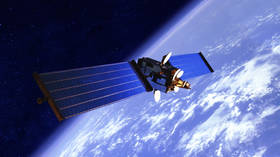Astronomers set up anti-satellite initiative

Astronomers from across the world have launched an initiative to curb the impact of artificial satellites on important astronomical research, arguing for tighter regulations on projects like Elon Musk’s Starlink network.
The International Astronomical Union (IAU) announced the creation of the Centre for the Protection of the Dark and Quiet Sky on Thursday, with president Debra Elmegreen saying it would help ensure that technological advances “do not inadvertently impede our study and enjoyment of the sky.”
The center describes its main mission as being to “mitigate the negative impact of satellite constellations on ground-based optical and radio astronomy observations as well as humanity’s enjoyment of the night sky.”
The body will engage with policymakers around the world in an attempt to tighten regulations on man-made satellites and space infrastructure. It will also push companies like Elon Musk's Starlink and Amazon’s Project Kuiper to minimize light pollution created with their satellites.
The work will be led by the US National Optical-Infrared Astronomy Research Laboratory (NOIRLab) in Tucson, Arizona, which is a center for optical astronomy, and the Square Kilometre Array Organisation (SKAO), which is headquartered in Manchester, UK and is delivering the world’s most powerful networks of radio telescopes.
Satellite networks delivering broadband internet are of the biggest concern for the scientists, as thousands of objects orbit the Earth at a relatively low altitude of only a few hundred kilometers. Their quick movement during dusk and dawn leaves bright lines that can be traced by telescopes and interfere with the readings. The satellite transmissions can also meddle with radio telescopes and astronomy antennas.
Astronomers Join Forces to Prevent
Starlink, Satellite Swarms From Polluting
Skies
The International Astronomical Union creates a new
coordination center devoted to the protection of night
skies from satellite mega-constellations, including
SpaceX's Starlink.
February 4, 2022

The astronomical community is setting up a center to work with companies and governments on preventing satellite networks, including SpaceX’s Starlink, from polluting the night sky.
The effort comes from the International Astronomical Union, which is made up of 12,000 members across the globe. On Thursday, the union announced a new “IAU Centre for the Protection of the Dark and Quiet Sky from Satellite Constellation Interference.”
The center was created out of concern that next-generation satellite networks will one day interfere with astronomical observations. SpaceX’s Starlink, for example, is designed to deliver high-speed broadband to millions of users across the planet. But to do so, the company needs to launch tens of thousands of satellites into orbit, which risk causing streaks across the night sky. Other companies, including Amazon, have proposed large constellations too.
The streaks won't just photo-bomb astronomy images; they could also disrupt scientific observations, including of near-Earth asteroids, the IAU said in a press briefing on Thursday.

“Astronomy is facing a watershed moment of increasing interference with observations and loss of science,” said Connie Walker, a scientist at the NOIRLab, an astronomy research lab. “At the moment there is little to no regulation in space with respect to optical astronomy,” she added.
However, the IAU's new center isn’t necessarily trying to stop the satellites from launching. Instead, the effort is about “mitigating” the negative effects from the upcoming constellations as companies develop them. The IAU also emphasized the center is focused on taking a “cooperative approach” with the satellite industry.
According to Walker, the IAU has already established relationships with three satellite internet companies including SpaceX, Amazon’s Project Kuiper, and OneWeb, and is talking with others. “A guidelines agreement with industry is in process at this moment,” she added. “We have confidence we can agree on some mitigation solutions, specifically before the design of the satellites has actually started.”
In addition, the center plans on coming up with best practices companies can implement when building their satellites to prevent them from reflecting too much light in the night sky. (SpaceX itself has already been designing new satellites to limit their brightness.)
At the same time, IAU plans to lobby lawmakers and policy makers—such as the FCC, Congressional committees, and the United Nations—on the need for better regulations.
“The goal of these kinds of policy activities is to make sure that good intentions of industry can also be codified into achieving regulations for all space actors,” said Richard Green, an astronomer at the University of Arizona. “If the profit motive (from companies) does start to intrude and make these mitigations difficult for them, we have some backup to say it really is a requirement that they look into these issues."


No comments:
Post a Comment